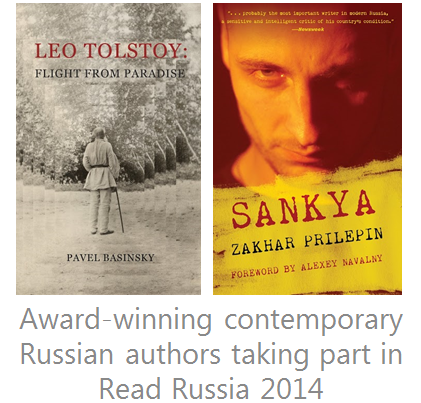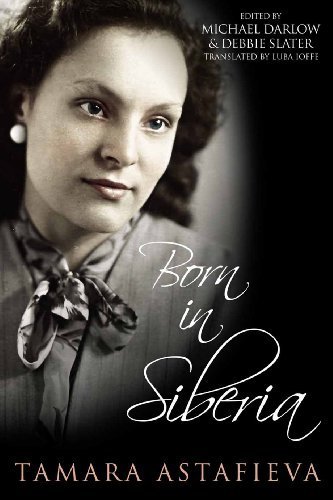Grigory Ryzhakov's Blog, page 5
April 6, 2014
The New Publishing Model: Haute Culture Books

With the advent of the digital revolution and self-publishing via Amazon Kindle and other multiple outlets, the Big Five publishing houses have been losing their share of the market that is now increasingly leaning towards e-books. However, certain publishing houses are not giving up on the print just yet.
Today I’m hosting an interview with Luis de Miranda, the founder and a CEO of Haute Culture Books. Luis is half Portuguese, half French, he lived in Paris, Stockholm, New York. From 2004 to 2012 he was the publishing director of Max Milo Editions in Paris. Luis is himself the author of 13 books, philosophical essays or novels written in French and sometimes translated in other languages.
Grigory: Luis, my first question is about your niche. Haute Culture Books seems to be a unique publishing house. If I understood correctly you release a book both in a digital format, which is free to download, and in print, as a limited edition of high-end priced books. How did you come up with this business model?
Luis: With our print books, my aim is to create unique objects that make the poetry of the text tangible. As we all spend more time in front of a screen, I believe the experiential aspect of the printed book will become more important, with readers looking for a higher quality object that comes from limited editions. Our books embody my great respect for the ritual of reading and the craftsmanship of book making.
Sales of these limited editions support the distribution of our e-books, and buyers will, in effect, become benefactors—or “Book Angels,” as we call them. This model allows individuals to become mini-Medici’s, supporting culture while enjoying a luxurious object that will increase in value year after year. I believe this model will satisfy collectors and book lovers alike.
As e-books become cheaper and cheaper rather than try to wring out diminishing profits, I’ve tried to create a model that does not depend on e-book sales and allows us to reach as many readers as possible. Free e-books are the way to go.
This is summed up in our slogan: Physical books should be sublime, digital books should be free.
Grigory: What are the selection criteria for books that you decide to publish?
Luis: I tend to choose books I’ve read and appreciated in French. It’s also important to choose authors that are important, even iconic in their homeland. Honestly, though, as a young company we’re still in the experimental phase of the brand and constantly adapting our strategies in order to come up with the best possible publishing model for our mission.
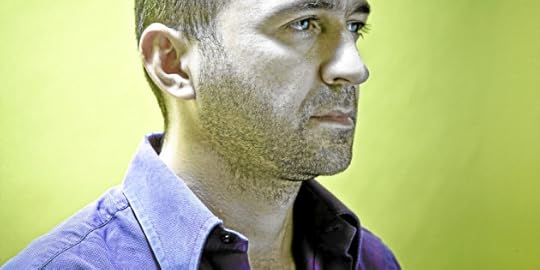
Luis de Miranda, CEO of Haute Culture Books: ‘Physical books should be sublime.’
Grigory: Your new release is the English translation of the cult novel written by Yuri Mamleev in the 1960s called The Sublimes (Shatuny). How did you become interested in The Sublimes?
Luis: I read Shatuny in French a few years ago and thought it was a mind-blowing experience. I expected it to have already been translated and published in English so when I noticed it hadn’t, I immediately contacted Mamleev and his agent, who loved the idea. The Sublimes is the kind of novel that deserves a Nobel Prize, except that it might be too disturbing for the Swedish Academy.
Grigory: What themes explored in The Sublimes make this book interesting for the contemporary reader?
Luis: It’s the narration of different quests for the absolute. It expresses the desperate need, in a materialistic and standardized world, to touch the divine, the spiritual, the mysterious. In a way, capitalism today is like Sovietism in the Sixties, when the book was written: it’s a consciousness dictatorship, a reduced form of reality that imposes its spiritual imperialism on our souls.
Grigory: Are you planning to publish more gems of the world literature and, if yes, what authors are on your mind?
Luis: We are. I have different books in mind that have never been translated into English, but first we have to find an investor to continue and produce our first three books to deliver them to the shops.
Grigory: What is the long-term mission of your publishing house?
Luis: Helping a more intelligent and generous civilization paradigm to emerge. Each of our books is a virtuous virus placed in the middle of the matrix, and from both the beauty of the text and the object itself waves of freedom will emanate. The free diffusion of the e-books will accelerate the access of the global psyche to richer and less standardized view of the world. We’re also creating an art collection of singular book-objects that actualize the spirit of the book in a shape that captures our sense of wonder, creating a better atmosphere in which to discover those texts.
Thank you very much for this insightful interview and I wish all the best for Haute Culture Books.
Luis will be launching Yuri Mamleev’s The Sublimes next week at the London Book Fair (Thursday 10th of April, 15:00 – 15:30): Stand Y 455, Y 425, Y 405, EC2.
April 4, 2014
Russians Are Coming … to London Book Fair 2014
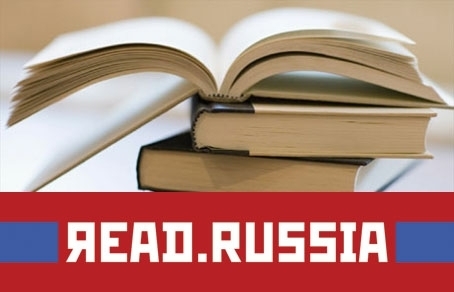
2014 is the Russia-UK Year of Culture. Those of you who live in the UK or visit the country as tourists have the opportunity to attend multiple Russian cultural events : opera, theatre productions, art exhibitions and, of course, literary events. You can find all the information about this on the official website.
Now the biggest literary event that will showcase modern Russian books this year is London Book Fair, which will take place at the Earls Court Exhibition centre next week, on the 8-10 of April.
This year I’m helping out at the ReadRussia stand (Y405,Y425,Y455, EC2). I’ll be there all three days, especially before afternoon. Please come along and say hello. I will be happily obliged to answer your questions about Russia literature and all the new books and authors introduced at the stand.
Morever, I’ll be launching my new book, a literary techno-thriller called Made in Bionia. Come along and receive a Bionian fridge magnet and a book card from me.
Occasionally, I’ll go to the AuthorHQ hub for some seriously good seminars for authors and anyone interested in writing and the publishing industry. If you are attending LBF this year, don’t forget that there will be a FREE photo shoot at AuthorHQ, book your slot.
Back to ReadRussia. This year’s programme is featuring a great diversity of modern Russian authors – Zakhar Prilepin, German Sadulaev, Pavel Basinsky, Dmitry Bykov, Eugene Vodolazkin and Alexander Terekhov to name some of them.
Tuesday will kick off with an announcement of 2014 Translation Prize. There will be discussions on the literary institutions in modern day Russia and also the biggest Russian literary award, The Big Book Prize, will be introduced.
On Wednesday, a presentation will be given about St Petersburg International Literary Salon and the new gems of Slavic literature published by Glagoslav. There will also be a seminar about Russian YA books and talks focusing on translating modern books and Russian poetry.
Finally, Thursday will be highlighted by a presentation of the Anthology of Russian Poetry by Evgeny Evtushenko and an exciting talk about the future of Russian literature. Haute Culture Books will launch the first English translation of Yuri Mamleev’s novel The Sublimes. Of course, there will be many more events in the programme, which may interest you. Come along and meet contemporary Russian authors, including me, in person.
Also, apart from the LBF, ReadRussia has organised a literary showcase taking place in various London locations, 7-11 April 2014. Take a look at the programme.
I’m looking forward to see many of you at the LBF next week. Till then, bye!
March 27, 2014
London Author Fair and Book Crowdfunding via Pubslush
A month ago I attended a first ever London Author Fair or #LAF2014. The conference was organised by Hayley Radford and Gareth Howard from @Authoright, who are an incredibly friendly and knowledgeable duo.
The LAF event was a smashing success. Seminars and workshops were so abundant, I could only attend a third of them.
The book marketing workshop started my day. Hayley Radford, she’s like a pub industry siren, I could listen to her for hours. She kept coming up with marketing tips and strategies. Maybe a radio show with her for authors would have been a hit too. 
The usual suspects like publishing with Nook and Createspace I skipped, because I already know how to do that, but they were great help for newbie authors. There were also workshops on editing, cover design and working with a literary agent. All in one day, tons of information.
Seminars on the state of the industry and the direction it’s going were very entertaining. The seamless Twitter coverage and panel moderation by @Porter Anderson was superb. By the way, check out his blog where Porter inexhaustibly writes about the latest things happening in the publishing industry.
Back to #LAF2014: some videos of the event are available on its website, check them out in case you’ve missed the conference (never do that again! Lol).
What else was on the menu? I liked a presentation about book tours from Out In The Army @JamesWharton, an openly gay soldier turned author and consultant. James talked about his personal experience in organising off-line book tours and the mechanics of it. If you like to find out about this, you can contact the charming man himself. If you are interested in online book tours, you may want to read this blog.
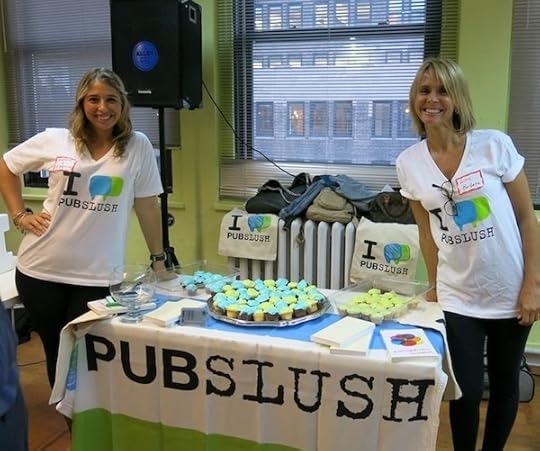
Amanda-and-Hellen-from-Pubslush.
The biggest splash on the day, imao, was caused by Amanda Barbara and Pubslush, the first book only crowdfunding company, that Amanda runs with her mum, Hellen. Pubslush’s workshop was a hit, the questions from the audience shot like bullets from a machine gun (this is where you do facepalm ha ha). Amanda deflected those questions with her passion and cheerfulness.
Pubslush allows authors and publishers launch crowdfunding campaigns in order to produce and publish manuscripts. Pubslush is also a charity fighting illiteracy. You can become their ambassador and raise awareness about their work.
I decided to test Pubslush myself. I have just launched a crowdfunding campaign with them for my upcoming book, Made In Bionia. I need reach a minimum target required to release the funds, which I set myself. This should be at least $500 on Pubslush, if you don’t reach your minimum – your supporters don’t get charged.
If the campaign is successful, where do the money go in this case?
offset against publishing expenses (editing, publicising, graphic design, merchandise)
a part of the proceeds are going to the Pubslush charity to help fight illiteracy around the world
Depending on the amount of money donated, supporters will get different rewards, which can be anything like the funded e-book (rewarded when it’s published), acknowledgement in the book or social media, or SWAG packages and meeting the author.
If the campaign doesn’t reach a minimum target, supporters don’t get charged.
What are the benefits of crowd-funding?
to ease financial burden of publishing a book
if the project gets funded, this means there’s an audience for it.
Check out my campaign, I’ve got a cool book trailer, nice rewards and a Q&A to lure you all in there. Ha ha. I still need to work on my siren song.
Oh my, I’ve met Peter Parker (@GrigoryRyzhakov) pic.twitter.com/BmWqSP0AWm
— Ben Galley (@BenGalley) February 28, 2014
The LAF’s afterparty was great, I mingled with everyone who failed to run away in time (ha ha) – folks from Blurb, who were very amicable, Ben Galley who claimed moi’s resemblance to Spiderman. Luke Talbot, Lucy Kelly, Roz Morris and Polly Courtney were amongst a few great authors with whom I had lovely chats at LAF. Hopefully, I’ll see you all guys soon in Earls Court, at the London Book fair (LBF), April 8-10.
Speaking of LBF, I’m going to hang around at the Russian stand and AuthorHQ all three days and present my new book. So, if you happen to pass by, come and say hello, I’ll bring some swag for incentives.
Haven’t signed up for LBF2014 yet? Naughty!
It will be full of author events, honestly, I’m not being paid by LBF, I would simply be happy to meet y’all there. The admission ticket is just thirty quid. 30 quid! For three days! Bargain.
LAF. LBF. The trend is clearly towards LCF being next (off googling … hmmm).
There should be an LRF – London Readers Fair. That’s more like it, don’t you think?
And finally here’s the first book trailer for Made in Bionia, I wrote the music for it too. Enjoy!
http://www.youtube.com/watch?v=r9ratipCGW4
March 24, 2014
The Dark Side of Russian Literature. The Sublimes by Yuri Mamleev
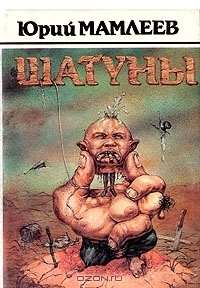
‘The Sublimes’ by Yuri Mamleev, a Russian edition cover, click to get the book in Russian
Almost half a century ago, in 1966, a book was published unofficially via samizdat in the Soviet Russia. A book that both terrified and dazzled the literary establishment. This was Yuri Mamleev’s novel, Shatuny.
If comparisons could be drawn in terms of its shocking value, Shatuny is a Russian equivalent of A Clock Work Orange, only darker and more insane, full of philosophy, esotericism and spiritualism.
Over the years, the novel became a cult classic, and Russia produced Mamleev’s literary followers like Vladimir Sorokin and Victor Pelevin who continued exploring the limits of mankind and the dark side of humanity.
Only a few extracts were published in the West in the 80s and the critics were overwhelmed with its power and darkness. At the time it was suggested that mankind wasn’t ready for such a book and it’s only now that the first complete translation ever has appeared thanks to the Haute Culture Books edition.
Soon you will all be able to make your own opinion about this astonishing, dark and unforgettable book. For now, I will share with you my very subjective view of the novel.

The teaser cover of The Sublimes. The English translation of Mamleev’s novel is by Marian Schwartz, published by Haute Culture Books
In The Sublimes our world is a realm of death. The story is set in the 60s in the Soviet Union. The characters are trying to grasp the big questions of ‘being’, existence, of human nature and human soul, through death, to reach the higher ‘metaphysical’ status, to defy mortality.
The main character, Sonnov (in Russian his name means sleepy, dreamy) perceives the world around himself as an illusion. He kills strangers for a particular reason, unclear to anyone including himself: it is something to do with death and its connection to reality and his soul. Many conversations in this book are attempts to explain or perhaps even rationalize Sonnov’s reasons and view of the world.
He has philosophical conversations with his dead victims as a bona fide psychopath. He is not educated and his quest comes from his inner irrational urges, which he can’t explain, it is not a result of a thought-through personal doctrine.
His ’educated’ twin in the story is called Anatoly Padov (in Russian his surname means ‘falling’). Padov and his other ’metaphysical’ friends from Moscow uses evil, act or thought, as a mean to overcome human limits. Padov is fascinated with Sonnov and goes to meet him to find out whether Sonnov kills people ’metaphysically’ or physically (in reality).
The novel presents the lore of such monstrous characters indulging in the extreme sexual perversions, violence and never-ending intellectual quest into the higher metaphysical state.
The educated ‘I-meta-physicists’ and simple people like Sonnov are united by their fascination with death. To me, it’s their way to escape from meaninglessness of life.
Mamleev writes in The Sublimes, ’Life is, in itself, a retribution.’
Sonnov finds that he won’t get anywhere by killing commoners, who are just ‘the living dead’ anyway. So he decides to target the ‘I-meta-physicists.’ As if their death could be the way to extract a new metaphysical knowledge, a higher meaning…
There is so much evil and madness in the book, that one has to shut down one’s emotions to grasp the story and scrutinize Mamleev’s themes. The total freedom the characters in the book mean to reach through evil and death is terrifying. And to me it’s not freedom, because one can never be free from oneself and from all that information that goes through our minds. To me, it’s just a different state of mind, however twisted it may be considered. And there is no reason to think that it can allow for more understanding of our world and us.
The Sublimes is about to find its daring and fearless English-speaking reader. This book will change your perception of the human nature. This is literature in its boldest, art in its pure sense, – uncompromising and limitless.
Further reading: In this blog post I’ve only touched the tip of this literary iceberg. Here‘s another recent blog post about this fascinating book. Also you may find curious the analysis of The Sublimes in Alexander Etkind’s essay. Finally, there is an intriguing article on Mamleev’s writing by Evgeni Gorny.
March 3, 2014
The Crimea of Discord. Reading Putin’s Mind
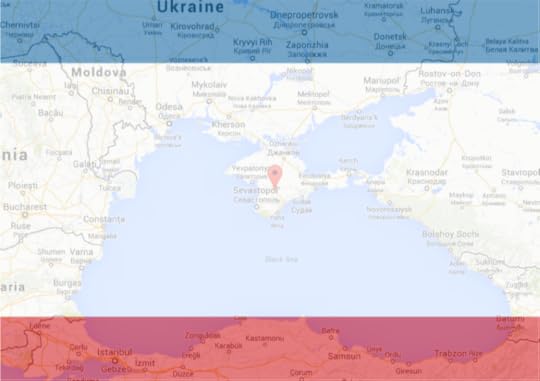
The Black Sea area over the Crimean flag
While the whole world is waiting for Putin’s next move in Ukraine, I’m contemplating about his motivations.
After enjoying the diplomatic success and outplaying the White House in Syria and triumphantly hosting the Winter Olympics in Sochi, Putin was at the height of his popularity in Russia and probably outside Russia too. Why did he decide to go into such mess now? Is this euphoria making him feel invincible and act inadequately or is this the Kremlin’s strategic decision? I think it’s the latter.
WHAT HAPPENED: Several months ago, the people of Ukraine had run out of patience with Mr Yanukovych who busied himself during his presidency by stealing as much money as possible, leaving the country on the brink of the financial disaster. Yanukovych’s sudden refusal to go down the Eurointegration route was the final drop. Maidan reignited with the new strength, which ended up in the horrible bloodshed in Kiev and ousting Yanukovych last month. The new interim government announced that the country is in wrecks and it will need huge international financial help. That’s when Putin decided to make his move.
PUTIN’S EXCUSE.
Russia claims that the new government in Kiev is ultra-nationalist/fascist and there’s a threat to the ethnic Russian minority living in Ukraine. Certains Maidan’s leaders had indeed slipped several ‘russophobic’ remarks including variations on banning or limiting the status of the Russian language in Ukraine. A nationalist organisation Right Sector and the party Svoboda were indeed a big power on Maidan but their political support amongst Ukrainians seems to be greatly overestimated. Still, their presence in Kiev is used as the main excuse by the Kremlin not to recognise the new Ukrainian interim government.
So, officially the Kremlin ‘invaded’ Crimea to protect Russian Crimeans from Kiev’s violent nationalists. It’s very possible that Putin will continue using the same excuse by introducing his military contingent further into the mainland Eastern Ukraine.
THE REAL REASON behind the Crimean move is geopolitics. For many years Yanukovych collaborated with the Kremlin to anchor the Ukraine firmly into the Russian political harbour. With the new government in Kiev, aiming to join the EU, the Kremlin is losing its power. Moreover, there is a fear that Kiev may even revenge Moscow by kicking out the Black Sea Fleet from Crimea. The fear is not entirely groundless. Ukraine desperately needs money to avoid slipping into further economical dump-hole and the Kremlin thinks that Kiev might offer Nato or US to build up their presence in the Ukraine, right under the Kremlin’s nose. That would be not just a dangerous thing but also very humiliating for Putin. By allowing Ukraine to slip into hands of EU, Putin would show his weakness. And then the events of Bolotnaya and Sakharova may repeat again with possibly a different outcome for him. So, he decides to make his move on Crimea.
PUTIN’S STRATEGY could be to destabilise the situation in Ukraine until Ukrainians install a new pro-Russian leader. Yulia Tymoshenko could very be a consensus candidate tolerated by both Maidan and the Kremlin. Yet, she’s not so impressed with Putin’s idea of Crimea’s annexation.
By ripping Crimea off Kiev’s pie, Putin would protect the Russian presence in the Black Sea and his fleet. He would get further support from the patriotic bulk of the commoners in Russia and reduce the threat of new revolutions in Moscow. He would also get in the history textbooks as the ruler who brought Crimea back to Russia.
PUTIN’S TACTICS is one he learned from the US politicians – say one thing, do something completely different. Putin claims that Russian troops are peacekeepers in Ukraine. In reality, regardless whether it is good or bad, his troops are there to stop Ukraine sailing towards Europe, and if Kiev disobeys, to nip off Crimea.
PUTIN’S RISKS – The West knows very well that the only mean to scare the Kremlin is money. So the West threatens to freeze the Kremlin’s assets, cancel Russian visas, kick Russia out of G8 and other organisations. The risks are more than real as in the last couple of days the Russian currency, rouble, started plummeting as fast as shares of Russian companies. The Russian commoner will suffer as his savings devalue and the costs of living go up as a result of inflation. This is the only thing the people wouldn’t forgive Putin. They may not care about Ukrainians but they don’t like being robbed even if Putin’s reason is protection of Russian geopolitical interests.
WHAT WOULD PUTIN DO? He would try to ensure Crimea’s vote for its independence without escalating the violence. Most Russians won’t tolerate open aggression against Ukraine, and this could quickly lead to the new Russian revolution. So, the Kremlin would very likely imitate the intent of invasion but will try to force its agenda sneakily by nurturing the pro-Russian mood in Ukraine. An open aggression would be Putin’s political suicide.
COMPLICATIONS – as we have found out yesterday from her phone call to Obama, Merkel thinks that Putin ’lives in a different reality’. I doubt that he’s insane but he could greatly underestimate risks of the invasion, which could led to deaths of innocent people, both Russian and Ukrainian. Another possible complication is that both US and EU have their geopolitical interests in Ukraine and some forces in the West may provoke the Russian aggression. Indeed, Victoria Nuland has recently admitted that the US spent $5 billion on ’democratization’ (which the Kremlin interprets as ’destabilisation’) of Ukraine. Naturally, the Kremlin doesn’t fancy the interim government approved in the White House. I can only hope this Washington-Moscow chess game won’t result in another war.
SOLUTION: in my opinion, to make the politicians, especially Putin, tread carefully, the general public in Russia, Ukraine and the West should make a BIIIIIIIIG NOISE about it. We need to make things clear – the violence won’t be tolerated. The people should demand Yanukovych’s arrest and trial at the Hague’s international tribunal.
Politicians may play their games but they shouldn’t forget that it is the XXI-st century and human lives are not an exchangeable currency anymore. I know this sounds naive considering what’s been happening in Syria. But nonetheless, in case of the Kremlin using its military power further, it would be a disaster to respond the same way. This would lead to many deaths.
Ukrainians and Russians are brother nations and our people should disobey any orders, from the Kremlin or wherever, to fight each other. Haven’t people suffered enough, wasn’t there enough blood shed already? I hope we are better than this.
Let the peace win.
N.B. This was my personal subjective opinion. I’m not trying to persuade anyone in anything, just giving some food for thought.
February 26, 2014
New Russian Scifi – Future: Immortality and Overpopulation
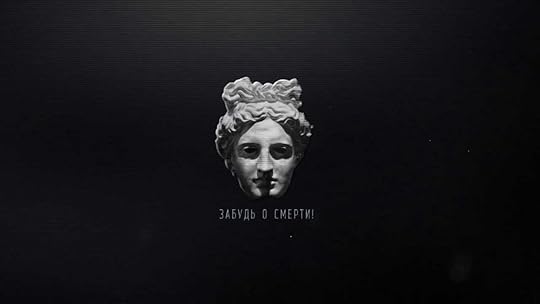
Forget the Death. (the central motto in the new Russian scifi novel “Future” by Dmitry Glukhovsky).
Dystopian and post-apocalyptic science fiction has been popular from the very birth day of the genre. Many recent novels of this kind focus on intricate plots, yet an occasional gem goes a notch above and explores some deep themes and ideas and things that may actually happen in the near future.
What if the mankind invented immortality? What would happen to the planet? How would the reproduction control work? What would happen to the economies and the political systems?
Future, a new scifi novel by a Russian author Dmitry Glukhovsky who created the Metro 2033 universe, gives a disturbing, grim and yet fascinating illustration to this scenario.
The mankind acquired immortality centuries ago. Europe is severely overpopulated. Conceiving a baby is forbidden without a license. If a child is born – one of the parents has to accept a virus injection making a person mortal at an accelerated rate. What happens to those children? They’re made into guardians of the state ensuring the birth control.

The soundtrack and panorama images of the “Future” are available on the official book Russian website. Click on the image to enter.
The main character, Jan Nachtigal, is one of those children turned into a cruel and ruthless soldier. It’s his tale. He is haunted by his childhood, yet what awaits him is lot more terrifying. It’s the answers. He will be torn by his duty, his love and his hatred. He’ll kill and he’ll let live.
Glukhovsky achieved a remarkable high-octane tension in the protagonist’s thought and feelings. It is the uncompromising storytelling, the vivid masculine prose, rude, politically-incorrect, that kept me reading this book. And what a grand finale that, in its accomplishment, made me, as a writer, very jealous. However much I disliked Jan, I couldn’t blame him for what he became, - some hardships break the hardest of us.
Future gives us some uncomfortable vision of the fate of our civilisation and proposes an equally uncomfortable yet prosaic solution to the problem:
If we are to survive, we need to respect our nature and they way we have been created.
The future will show our descendants whether or not the book was prophetic.
P.S. I can hear publishers rushing to buy the foreign rights.
P.P.S. I am thrilled to announce that my new book, the scifi novel MADE IN BIONIA, which is a grotesque take on the near future, will be out on Amazon Kindle in April 2014.
A private investigator, a secret society, a bio-terrorist plot, advanced marine virology – all richly peppered and marinated in romance.
So what is being made in Bionia?
February 5, 2014
Understanding of Russia – Born In Siberia
Living in the UK, I realised how many people outside Russia are interested in the modern Russian history, GULAG, Stalin’s rule and the life of Soviet people. The immense worldwide popularity of novels like Doctor Zhivago and Life and Fate is undeniable.
Here I would like to introduce a work of non-fiction, a memoir of Tamara Astafieva, a woman who grew up in the Soviet Union. Tamara’s story is a unique document of hard and fascinating life of common Russians in the USSR.
Below is a guest post by Michael Darlow who edited Tamara’s story, which was translated to English by Luba Ioffe.
Born in Siberia is the story of a remarkable Russian woman and her family from just after the 1917 revolution until the present. Told in her own words, with the help of some explanatory notes and occasional commentary by Michael Darlow and her friend Luba Ioffe, Tamara Astafieva’s story reads in places as if it were one of the traditional fables from the beautiful but fearsome land in which she was born.
Tamara Astafieva was born in 1937 in the depth of winter in a remote Siberian village on the Trans-Siberia Railway line where her father was the station master. Her story includes the death and starvation of members of her family during the great famines of the 1930s caused by Stalin’s programme of mass collectivisation of agriculture and the deaths other of family members in Stalin’s Gulag because they worked for the church, of hardship and the loss of beloved family members during the Second World War and hopes for a better life after it was won. She recounts her schooling in different cities around the post-war Soviet Union as her father moved from one post to another. Finally, in 1950, the family settle in Moscow. Tamara, a true romantic, describes her passionate love affairs, her marriage to the son of a general, the birth of her son and how she came to work for APN Novosti – the USSR’s official international press and information agency. At Novosti she rises to become a senior editor in the TV department, meets foreigners for the first time and mixes with members of the Soviet elite.
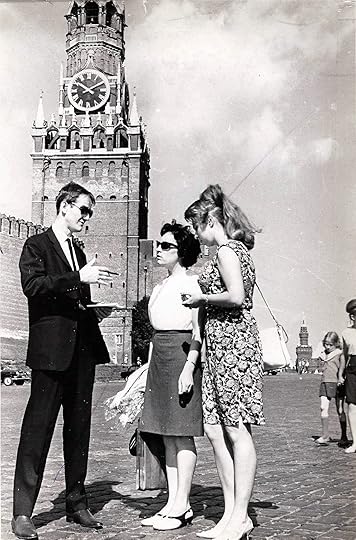
Michael Darlow with Tamara and Natasha (an interpreter) outside the Kremlin in Moscow in 1967 during the production of “Ten Days That Shook The World”
It was while she was at Novosti that I first met Tamara. In the autumn of 1966 I was sent to Moscow by Granada Television to work on a major co-production to mark the fiftieth anniversary of the 1917 Bolshevik revolution. I went with a very experienced, award winning documentary and current affairs producer called Norman Swallow. The programme was to be based on John Reed’s classic first-hand account of the revolution “Ten Days That Shook The World”. The production was significant not only because of the story it told but because this was the first major television co-production between a British television company and an official Soviet organisation. It was a somewhat daunting assignment. As we set off for Moscow we felt rather as if we were two atheists who had been assigned to work on a co-production with the Vatican about the Virgin Birth!
Our first few days in Moscow were marked by a series of scheduled meetings with Novosti officials to which they failed to show up and repeated warnings from British Embassy officials that wherever we went in the USSR our hotel rooms would be bugged and our every move monitored by the KGB. After almost a week in Moscow, during which we accomplished nothing, we had begun to fear that we would have to abandon the production. Things changed, however, when we met Georgi Bolshakov, the editor in chief of Novosti’s TV news division, and Grigori Alexandrov, the co-director with Sergei Eisenstein of the classic Soviet film “October”, and Alexandrov’s wife Lyuba Orlova, the star of many of the great Soviet musical films of the 1930s, who was adored by millions of Russians and reputed to have been Stalin’s favourite movie star. Bolshakov had been Novosti’s man in Washington during the 1962 Cuban missile crisis and had acted as the main back-door go-between between Khrushchev, Robert Kennedy and the White House. These three were powerful figures in the 1960s Soviet Union. After some drunken evenings in which we won our new friends trust, Bolshakov introduced us to a very attractive, dark haired young woman member of his staff who, he told us, knew all about the old newsreel film and other material we needed for our film and would be our researcher, guide and helper throughout the production. The young woman was Tamara.
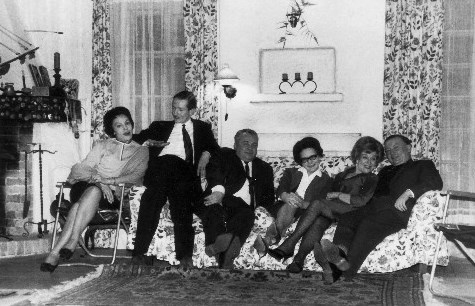
Tamara, Michael Darlow, Georgi Bolshakov, Ludmila Borozdina (Bolshakov’s
first assistant who was married to Boris Zhutovsky one of the so-called
‘Non-Conformist’ Group of painters who exhibited works which Khrushchev
denounced because they did not conform to the prescribed norms for Soviet
art), Lyuba Orlova and Norman Swallow
During the next two years I made frequent visits to Russia and got to know Tamara well. I met her young son and her husband and learned a little about her life. I witnessed at first-hand how, even though she was acting for an official Soviet government organisation, Tamara had to battle repeatedly through the bureaucratic mine-field, controlled by often deliberately obstructive petty officials, which was the Soviet Union of the mid-1960s. “Ten Days That Shook The World” was completed in the autumn of 1967 and shown, with a narration spoken by Orson Welles, on network television in the Britain and other countries around the world, but not in the USSR.
During our work Tamara had taken me to Leningrad to meet veterans of the 1917 Revolution. While we were in the city she had taken me to the Piskariovskoye Cemetery and Memorial to the almost one million Leningraders who died during the terrible 900 day siege by the Nazis during World War Two. That visit had so moved me that on my return to Britain I persuaded Granada TV to let me make a film about the siege and the terrible suffering and heroism of the city’s people – about which far too little was known in Britain. The resulting film, “The Hero City: Leningrad”, won numerous awards around the world and transformed my career.
Towards the end of our work together on “The Hero City”, Tamara was suddenly replaced by another woman, a stern-faced party apparatchik. No reason was given. But, in the spring of 1969, on account of the awards “The Hero City” had won, I was invited back to the Soviet Union. As an honoured guest I was able to persuade Tamara’s bosses to bring Tamara to the offices of Novosti so that I could thank her for all her hard work on our two films. In order to reduce the possibility of our conversation being monitored by the authorities I invited Tamara to go for a walk with me around Moscow. During the next hour, as we walked through the crowded city streets, Tamara told me a little about what had caused her fall from favour – how she had fallen in love with a Swiss film maker and tried to leave the country. After that one final, short meeting I did not see Tamara again. Although I had ideas for making more films in Russia the Soviet authorities refused to grant me a visa. I learned later, from an official who I had got to know in the Soviet Embassy in London, that my visa applications had been blocked by the Soviet Minister of Culture herself. It seemed I had offended the Soviet authorities by speaking out in public about the 1968 Soviet invasion of Czechoslovkia – where I had many friends in the movement for reform. As a result I did not return to Russia for many years and, although over the years I did have very occasional contact with two other Russians with whom I had worked in the 1960s, I lost touch with Tamara completely.
Then, almost forty years later, after the fall of the Soviet regime, my wife and I received a letter from Tamara. In it she told us something about her life since our last meeting. With the letter she included a short book of poems which she had written and three impressionistic essays describing important events in her life and the lives of members of her family. A correspondence began and Tamara sent more poems and descriptions of important emotional and imaginative moments in her life. Over time a deeply personal and moving picture emerged of the life of one typical, but also exceptional, Russian woman and her family from shortly after the 1917 Bolshevik Revolution until the present day. I began to suspect that here, in the life of this one woman, Tamara, and her family, was a distillation, an archetype, for the lives and experiences of millions of other ordinary Russians across the decades since 1917.
I told my long-time friend and publisher Naim Attallah, the proprietor of Quartet Books, about Tamara’s writing and my thoughts about it. He too read Tamara’s material and came to the same conclusion as me. The result is this short book. In it Tamara tells her story through a series of highly evocative, deeply felt impressionistic essays describing key places and events in her life, interspersed with short poems in which she distils her deepest thoughts and feelings. She describes her passionate but doomed love affair with the Swiss film maker, her daily struggles with unbending and unfeeling state and municipal officials, the birth of her son in a Soviet maternity unit and a horrific spell in one of the USSR’s notorious psychiatric hospitals. She describes return visits to her beloved Siberia – to her not the land of dread and hardship we have learned to picture but her beloved homeland full of human warmth and untrammelled natural beauty. Today Tamara is an old lady in poor health. She lives alone, surrounded by her memories, in a small flat in a high-rise block in a distant suburb of Moscow.
To help readers who do not know Russia I have inserted some sections of explanatory commentary and footnotes. There is also a short postscript, describing Tamara’s life now, written by her friend and translator Luba Ioffe.
Reading Tamara’s work has deepened my knowledge and understanding of Russia and of the Russians of my own, my parents and my children’s generation, the generation that lived through the Second World War, the Cold War and the years since the collapse of Soviet Bloc. I hope that reading this book may deepen the understanding of others as well.
December 31, 2013
December Flicks – Unleash the Movie Beast
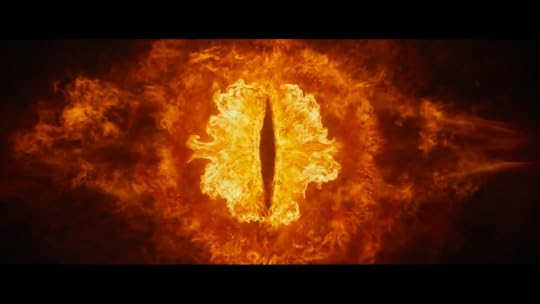
Still haven’t been to the movies to see Hobbit, part 2? Sauron knows about that… (boo)
December holiday season is an ideal time to watch films released throughout the autumn, especially because many of them are contenders for winning Oscars.
CAPTAIN PHILLIPS
http://www.youtube.com/watch?v=_3ASoBrFGlc
Captain Philips was the first for me to catch up with since it’s been released in October. The film is based on the real story of a trade vessel with an American crew captured by Ethiopian pirates in the Indian Ocean. The veteran Tom Hanks solidly plays Captain Phillips, but the real kudos goes to Paul Greengrass who directed the film.
It’s a very simple tale, a portrayal of men in peril, very much like Cuaron’s Gravity. In Gravity, it was Dr Ryan vs relentless nature (space and gravity), here – Captain Phillips vs pirates. Where to draw the line between professional responsibility, duty, and your own life? What risks should you take? And when is bravery justified?
Captain Phillips shows that people under a threat of peril behave differently than in normal conditions, exposing their true selves. In my opinion, one shouldn’t judge harsh if someone failed to meet professional expectations under such stress. I think people deserve respect just for trying to fulfill their duties and make things right.
There is a controversial opinion about the real life Captain Phillips’ actions, some of his crew said that he acted recklessly during the pirate incident.
I don’t know what’s happened there in reality, but this fascinating story has some lesson in it for prospective pirates: the US navy is a formidable force, well staffed and equipped to deal with heist situations like that.
THE COUNSELOR
http://www.youtube.com/watch?v=n4rTztvVx8E
The crueler lesson is taught to the audience in the latest Ridley Scott’s film The Counselor. This is a story about drug trafficking, written by a celebrated author Cormac McCarthy.
The main protagonist nicknamed Counselor played by Michael Fassbender is a lawyer who gets mixed up with a drug cartel by accident: a guy Counselor bails out of jail turns out to be a drug trafficker who gets killed and the cocaine is stolen. The drug cartel thinks Counselor is involved and the revenge is imminent – Counselor and his friend, a drug dealer called Reiner, are to answer. The cartel manages to get the drugs back from subordinates of the real thief, Reiner’s girlfriend called Malkina. Unruffled, Malkina sets a trap for Westray, another guy involved in the drug deal, to get access to his money.
Westray preaches a lot to Counselor, and he keeps saying he could just disappear and nobody would find him. Well, one can only disappear if nobody is interested in that person.
The lesson here is that the underworld operates according to the principle of social darwinism – the strongest survives. So, if one is linked to this world, even as an innocent bystander like Counselor’s fiancée Laura, this person can be hit by the ‘wood-chips flying out when the forest in being cut down’. One can’t be complacent and afford weaknesses like Westray had – cunning sharks would take advantage of that. And one can’t just hope for things to get better – the way Reiner and Counselor did.
The Counselor received mixed reviews mainly because of its gruesome, bleak story and a ‘heavy on the narrative’ script. I think the film will grow its audience once released on DVD. Cameron Diaz delivers a spectacular performance as one of the main antagonists, Malkina. One is frightened of her, but, at the same time, one is in awe. She despises cowards and respects predators. She reminds me of a virus – no fear, only invasion. She knows when to stay latent (dormant) and when to strike. And she has another useful tool for survival – being good at evading her adversary’s wrath.
SAVING MR BANKS
http://www.youtube.com/watch?v=a5kYmrjongg
Sometimes, your worst enemy is you. This is one of the themes explored in a beautiful film called Saving Mr Banks.
Pamela Travers, elegantly played by Emma Thompson, is an established author of the Mary Poppins series; but the money are running low, and her agent/editor begs her to sell film rights to Walt Disney (played by Tom Hanks). Pamela refuses to do so for many years, but the agent persuades her to come to Disney studios to LA and consider signing the contract there. Pamela is worried that her stories would be turned into ghastly cartoons. Yet she starts collaborating with screenwriters there and we gradually learn about the bitter truth behind the real Mary Poppins story.
Flashbacks into her childhood let us see Pamela’s loving relationship with her father. He was a dreamer and always told her to keep dreaming, to aspire to great things. We sympathise with the little girl who can’t grasp why her father, Travers Goff, was unhappy: was it because he had to do a mundane job to support his family or was it his alcoholism? We also learn that Pamela’s real name is Helen Goff – a personal tragedy made her to take a pseudonym after her father’s name.
I don’t know whether or not it’s true that it was Walt Disney himself who reasoned with Pamela to let go of the past. But that happened, Pamela signed the contract, and soon after the Disney’s adaptation of the Mary Poppins book came out. The story started to live its own life and Helen Goff found inspiration to write again.
KILL YOUR DARLINGS
http://www.youtube.com/watch?v=AxGgkEHmHHg
Kill Your Darlings is another story about a writer based on real life events. The future celebrity poet Allen Ginsberg, a Harry Potter lookalike who’s played by Daniel Radcliffe astonishingly well, goes to study at the Columbia University. There he meets a rebellious youth Lucien Carr and falls in love with him. Lucien introduces Ginsberg to other future notorious poets who established the beat movement – William Burroughs and Jack Kerouac. Lucien is constantly followed by his older lover, David Kammerer, a strikingly contrast performance to his usual Dexter by Michael C. Hall.
It’s fascinating how one of the most intriguing cultural phenomena of the last century started out with a murder: when Kammerer learns from Ginsberg that Lucien is about to escape abroad, he tracks his young lover to his own peril. One does think that a restraining order would have sufficed, but then life is often illogical and there would not have been any story.
Both Kammerer and Lucien were to blame for the disaster. Kammerer was in madly possessive love and Lucien couldn’t reciprocate – he was only interested in men for the sake of entertainment. Moreover, Kammerer was providing academic essays for Lucien, which was another incentive for Lucien to go on with that dysfunctional relationship. Ginsberg was a mere bystander, a naive and impressible youth who had to live on with the guilt.
BLUE IS THE WARMEST COLOUR (LIFE OF ADELE)
http://www.youtube.com/watch?v=Y2OLRrocn3s
While the LGBT theme is rather secondary in Kill Your Darlings, it is central in a French film, Life of Adele: an eighteen years old college girl falls in love with an older girl who is an art student. The film goes through their bumpy relationship in a quite semi-documentary manner. The director Abdellatif Kechiche doesn’t seem to like editing much: whether it’s sex scenes or pasta eating – they are almost uncomfortably long and rather naturalistic. Nothing escapes from the intrusive camera. Sometimes it feels like it’s immoral to demand so much emotional and physical exposure from the leading actresses who received Palme d’Or at Cannes Film Festival earlier this year for their performances in the film. Akin to Gravity and Captain Phillips, Life of Adele is a portrayal of life; it doesn’t feel like a piece of fiction. Emotions go overboard. Trivial things we often see in the movies like cheating, heartbreak, first kiss, – they feel real, and I couldn’t help but think that I’m peeking through the keyhole at someone’s life. This is cinema at its best.
DON JON
http://www.youtube.com/watch?v=bcGO_oAahV8
Amongst various reasons why relationships fail, addiction to porn is definitely an amusing one.
Josef Gordon-Levitt plays a not particularly intelligent barman called Jon who has this addiction. Jon meets a voluptuous yet very bossy girl, Barbara Sugarman (Scarlett Johansson), who isn’t very impressed about his fascination with porn and the fact that he cleans his flat by himself. She’s got an agenda and sees him as a part of her social ladder.
Jon is rescued by a mature woman, Esther (Julianne Moore), who recently lost her family. Esther is not judgmental; she takes Jon for what he is, and he learns what the real intimacy means.
Don Jon is a very funny movie. Jon’s parents only interact with him and his girlfriend in a superficial manner, yet the ever-phone-glued Jon’s sister Monica (Brie Larson) turns out to be no dummy at all. She’s too intelligent toget involved in the family conversations, yet her diagnosis of Barbara’s true intentions is spot on.
ALL IS LOST
http://www.youtube.com/watch?v=Lk_R04LfUQU
A new trend of survival films set by Life of Pi last year continues here. The Hollywood veteran Robert Redford plays a sailor who’s stranded somewhere in the Indian Ocean. A floating cargo damages his boat, a small yacht, and the water gets inside. The sailor manages to seal the gap and pump out the water, yet the boat is drifting towards the storm, and the sailor faces new calamities.
The film could be viewed as a ‘mockumentary’: the scenes of imminent peril look very real indeed. All Is Lost also educates the spectator about things that could possibly be done in such a disastrous situation. Knowledge of nautical science is most welcome.
The week long struggle for survival in the sea portrayed in the film, first on the yacht, then on the inflatable lifeboat, is mesmerizing. Humans are immensely enduring creatures when it comes to survival. Ironically, in case of our sailor, only the most risky and perilous thing will be able to save his life.
THE HOBBIT; DESOLATION OF SMAUG
Honest trailer for The Hobbit, part 1
http://www.youtube.com/watch?v=Sc32YdEWHzo
and the official for part2
http://www.youtube.com/watch?v=Qt1MvdPYD1U
I was genuinely surprised to find myself enjoying The Hobbit-part2 so much. The story takes off immediately and reaches the heights of the Transformers in terms of action sequences. The bumpy river descent of hobbits in barrels will make a cinema history. The fight with the dragon called Smaug is no less impressive.
The film is dynamic and humorous as the first installment should have been. Peter Jackson faced the difficulty of adopting a small book into a nine-hour long trilogy movie, so he decided to use characters from the LOTR, such as Legolas and Sauron, in the film to add to its epic scale.
A romantic subplot between a dwarf Kili and an Elvish female warrior Tauriel (hello, political correctness) is also most welcome. We have some cliffhangers, such as an antagonistic encounter between Gandalf and Sauron and the dragon planning to attack Lake-town.
It’s great to see the story’s protagonist, Bilbo Baggins, growing in confidence and fighting spiders and the dragon with astonishing (it’s my favorite word now) resourcefulness. Smaug may think that size matters, but it is wit that prevails in the end.
Happy New Year, y’all!
I wish you loads of wit to prevail in the New Year!
December 22, 2013
Merry Christmas
Everyone, have a great Christmas! I wish you to be stronger, happier, better, feeling more love and sharing more good with others. Merry Christmas!
And here’s my this year’s Christmas song for you.
SAD MERRY CHRISTMAS
Rays of the sun
Caressing tree tops,
But in my heart it’s raining on.
There seem no end to all these tear drops.
You’ve gone away with no good-bye,
No leaving notes, no reasons why…
This Christmas
I’m feeling all alone.
No fun, no merry songs for me.
I love you -
The words you never said to me.
Who knew how very sad could be
Merry Christmas.
Friends are telling me to move on -
Stop looking back, the time shall heal.
I hope one day I could forgive you.
And meet someone whom I could trust.
To find happiness at last.
This Christmas
I’m feeling all alone.
No fun, no merry songs for me.
I love you!
The words you never said to me.
Who knew how very sad could be
Merry Christmas.
Let’s hope the sky is clear tonight.
I’ll pick a star and make a wish.
I won’t give up without a fight,
I burned but I’ll rise from the ashes.
This Christmas
My friends will come along.
We’ll dance to merry songs.
Together.
I love you!
I’m a wreck but I’ll be fine.
Let’s carry on and start afresh in time
For Merry Christmas.
December 11, 2013
Music and Emotion. The Appeal of Sad Songs
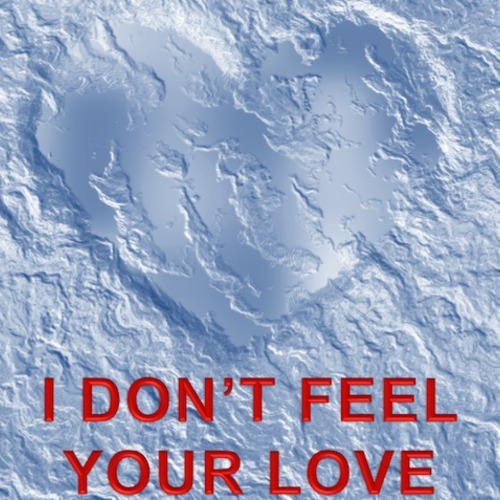
Some of you know that Grisha McArrow is my musical alter ego. My new song called I Don’t Feel Your Love Anymore is about heartbreak, but it is also about why we fall out – problems in communication and the loss of trust.
I wonder why sad songs touch us more than their merry sisters? I certainly prefer to listen, compose and sing sad songs.
I Don’t Feel Your Love Anymore by Grisha McArrow © 2013
Is there way to mend
What’s not meant to be?
Is there point to try
When you stopped loving me?
Why do I believe it’s just a phase and you’ll come back to me.
The usual story
Of How two fell apart…
Who knew it could be us,
We’ve had a great start.
But later I noticed
You don’t listen to me.
Baby, I’m sorry.
Why don’t you see?
If you don’t open up, our love is doomed. I beg you, speak to me.
I don’t feel your love anymore.
Is this what the fate had in store for me?
If you don’t speak your mind out how can we
Set right what turned wrong between you and me?
Baby, don’t hide it.
What’s happened to us?
Is worth trying
To fix up the trust?
Do you still care?
Oh I ruined it all.
Don’t let despair
To poison my soul.
Is there hope for us? Please talk to me, just give us final chance.
I don’t feel your love anymore.
Is this what the fate had in store for me?
If you don’t speak your mind out how can we
Set right what turned wrong between you and me?

